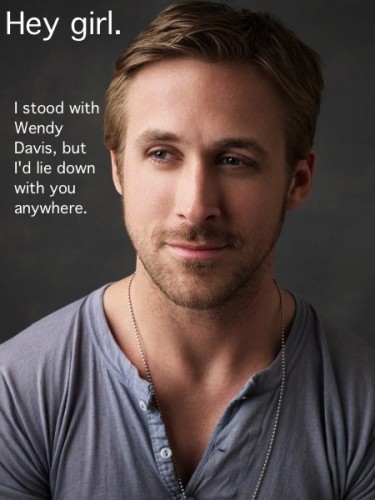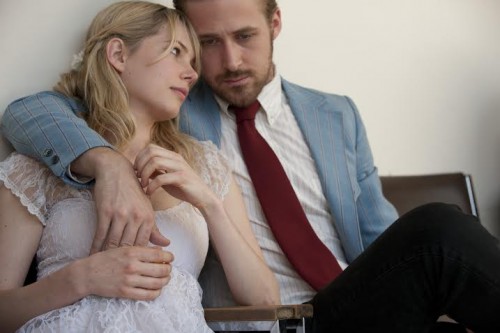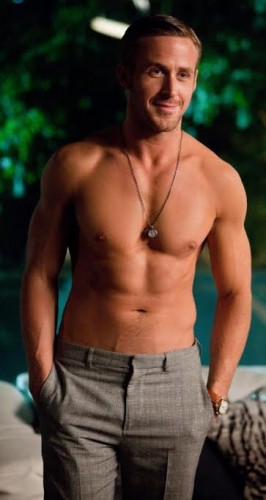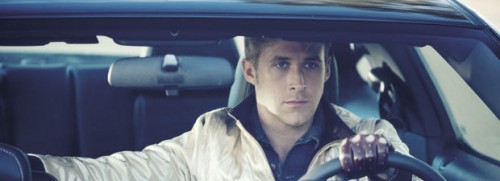
Written by Rachael Johnson as part of our theme week on Male Feminists and Allies.
Canadian-born Ryan Gosling is a talented actor, charismatic movie star, and global sex symbol. The Notebook (2004) made Gosling a romantic screen icon but he has also, of course, given a number of inspired, thought-provoking performances in both independent and mainstream movies. His roles have been mostly varied and complex, but if you want a general sketch of his screen persona, I would say it’s a potent mix of melancholy, vulnerability, romanticism, and sensuality. There is also an aggressive side. While they may retain a vulnerable aspect, he has played quite a few violent men. A seductive presence on the screen, Gosling is also an object of desire for multitudes of women around the world.
The star’s off-screen image is also engaging. There is a welcome lack of smugness and he comes across as charming and good-humored in interviews. In his personal life, he seems to have a refreshing preference for women older than him. Thanks to the “Feminist Ryan Gosling” tumblr, the actor has also become a sweetheart of online 21st century feminism. For people who have not yet heard of Danielle Henderson’s site, it features funny memes that couple photos of Gosling with gender studies quotes. The man, himself, has also exhibited a certain feminist awareness in public life. When Blue Valentine (2010) was given an NC-17 rating by the MPAA for a scene showing his character giving his wife oral sex, Gosling slammed the decision as sexist. He pointed out that it is “okay” to show sexual violence in American movies but not “a woman’s sexual presentation of self.” Mixing the romantic and the progressive as well as the courtly and the hip, Gosling’s star persona is attractive to female and feminist audiences. Any appraisal of Gosling’s feminist reputation should, therefore, not only consider his online image, star persona and political opinions but also reflect on his roles and performances. How is masculinity embodied in his screen characters and how do his films represent gender? Let’s first look at that site.

Danielle Henderson started “Feminist Ryan Gosling” in 2011 when she was a graduate student. As she explains on her site, the blog was started as an academic joke. Her internet memes typically feature shots of the star–paparazzi, publicity and film stills–accompanied by quotes by feminist cultural and intellectual figures. They reference Gosling’s romantic appeal and the source of the humor, of course, comes from the mismatch between text and image. Although an essentially humorous site, “Feminist Ryan Gosling” is actually a pretty important pop cultural phenomenon. First, it is an entertaining example of the democratic potential of online culture. It shows that we do not have to be mere passive consumers of the Hollywood star product. We can, moreover, appropriate the image of the star for our own purposes. This is a quite subversive thing, of course. It may even be dangerous in other contexts–imagine a right-wing, homophobic appropriation of a star’s image–but “Feminist Ryan Gosling” is a positive, good-natured tribute with progressive aims. A gender studies student has contributed to the shaping of a male Hollywood star’s persona while advancing feminism in a way that is seductive to a mass audience. “Feminist Ryan Gosling” was, incidentally, turned into a Running Press book in 2012.
Gosling’s good looks play a starring role in all of this, of course. Although the actor is perhaps not classically handsome, he is an exceptionally good-looking guy with a classically desirable Hollywood body. His slim, muscular form is, in fact, part of his star persona. In the comedy-drama Crazy, Stupid, Love (2011), it is even the object of humor. Here, Gosling plays a womanizer who gets involved with a young law school graduate played by Emma Stone. When she first sees his buffed body, she protests, “Fuck! Seriously? It’s like you’re photoshopped!” It is a nice send-up of a certain side of his image. Gosling may not display his body or express himself sexually on the screen like Michael Fassbender–few do–but he has shown interest in thought-provoking sexual themes. He is also not frightened of being the object of the camera’s gaze.
Handsome and charismatic, Gosling, of course, fulfils the norms and ideals of Hollywood stardom. For more than a decade, however, he has been one of the more interesting younger male talents in American cinema. Gosling has, in fact, made some fascinating choices and many of have been conspicuously atypical. He’s never really been a boring pretty boy and he’s rarely played it safe. In the controversial The Believer (2001), Gosling plays a young Jewish man who becomes a neo-Nazi. That was his first major role. Gosling is not frightened of playing unconventional male roles. In Half Nelson (2006), he plays a charismatic history teacher with a drug habit. Many of his characters also complicate our ideas of American manhood. In fact, he’s played men who destabilize traditional norms of masculinity. I’m going to look at a couple of roles that offer complex, subversive portraits of masculinity–Blue Valentine and Lars and The Real Girl (2007)–as well as one that is more typical of his more conventionally or mythically masculine roles, the part of the stuntman and getaway driver in Drive (2010).

Directed and co-written by Derek Cianfrance, Blue Valentine is one of the great love stories of the Millenium. Intimate, intense and naturalistic in style, it is a world away from The Notebook. While The Notebook is a distinctly old school affair, an epic romance steeped in sentimental clichés, Blue Valentine is an inventively structured drama that depicts both the ecstasies of sexual and romantic love and the painful collapse of a marriage. It’s the story of Dean (Gosling), a house painter and Cindy (Michelle Williams), a nurse. When they first meet, she is a student and he is a furniture mover. Cindy’s background is middle-class and Dean is the son of a janitor. They fall in love and Cindy becomes pregnant. It is not certain if Dean is the father as Cindy has had a recent relationship with a fellow student. He accompanies her to the abortion clinic but Cindy decides to keep the child. They start a family together.
Blue Valentine is a riveting, heartbreaking tale, and both actors give powerful, first-rate performances. Dean is, in many ways, characterized as an average, heterosexual working-class guy. In terms of physical appearance and dress, the character conforms to conventional masculine norms. Thankfully, he’s not a working-class type conceived by Hollywood. His portrait is well-drawn, persuasive and sympathetic. A contented beer-drinker and chain-smoker, he is generous, caring, feisty and romantic. Note that Gosling’s character is not a traditional patriarchal figure. He is capable of sexual jealousy, it is true, but because of his love for Cindy, Dean is willing to embrace the child of another man as his own. Biological paternity, paternal ‘ownership’ of a child has, of course, been integral to patriarchy and his generosity of spirit goes against these conventions. Dean’s lack of ambition- ambition in the conventional sense- also defies cultural expectations of gender. He’s quite happy with his situation. Being a father and husband, he says, is more important to him than work.

Dean ultimately comes across as the more vulnerable of the two. He clings to their dying relationship, refusing to believe that Cindy has fallen out of love with him. Interestingly, Dean rages against traditional conceptions of mature masculinity. When Cindy says she’s ‘more man’ than Dean in a heated argument, he asks her what being ‘the man’ means. It is Cindy who is unhappy with her position in life although she is proud of her nursing: she planned to study medicine before falling pregnant. It is, you sense, the source of her unhappiness despite her love for her child and husband. Blue Valentine accepts the messiness of love and life, and neither character is judged. What is interesting is that it shows a man perfectly content within the domestic space and a woman who feels suffocated and unfulfilled. Cindy’s understandable frustrations are sensitively addressed and Dean’s characterization is distinctly non-masculinist. In these ways, Blue Valentine could, therefore, be said to have a progressive take on the needs and desires of men and women today.
The portrayal of sexual love in Blue Valentine is intimate, authentic, and sometimes raw–too intimate and authentic, it seems, for the MPAA who gave it an NC-17 rating for a cunnilingus scene. Gosling rightly read the decision as “a product of a patriarchy-dominant society.” He criticized the MPAA for “supporting scenes that portray women in scenarios of sexual torture and violence for entertainment purposes” but not allowing “a scene that shows a woman in a sexual scenario which is both complicit and complex.” The ruling reflects unhealthy, archaic sexual attitudes but we should not be surprised by it. Hollywood still sanitizes sex and love, and it is still misogynist: oral sex should only be given to men, of course, and if cunnilingus is permitted, it must be stylized. Thankfully, the decision was overturned on appeal and the film was given an R rating. Gosling came off as impassioned and genuine in the debate.
In the comedy-drama, Lars and The Real Girl, Gosling also plays a man who destabilizes conventional notions of masculinity. He plays Lars, a deluded young man who has chosen to have a romantic relationship with a life-size sex doll named Bianca. It may sound downright creepy but Lars is effectively portrayed as sweet-natured, troubled guy much loved by his family and supported by his community. It is actually quite funny and moving to watch his loved ones and neighbors play along with the fantasy. It is the unspoken hope that he will one day not need his plastic girlfriend. Suffering from a childhood trauma, the vulnerable Lars fears physical intimacy. Note also that there is no sex between Lars and the doll: Bianca’s a missionary.

Written by Nancy Oliver and directed by Craig Gillespie, Lars and the Real Girl is an unusually warm-hearted, offbeat experience. Gosling is happily unglamorous in the role. The pale, mousy-haired Lars sports a moustache and distinctly unsexy sweaters. Gosling’s body is slacker, softer and fleshier than usual. In short, Lars is the antithesis of the hard, hyper-virile Hollywood hero. There is, ultimately, the blissful promise of real love for Lars with a real girl. Does this promise celebrate the romantic union of equals or does it actually indicate a conservative undercurrent at work in the film? In other words, does normalization mean masculinization and marriage? Or does it merely present a benign case for benevolent masculinity? In one scene, Lars asks his brother how he knew he was a man. He answers, “You grow up when you decide to do right…and not what’s right for you, what’s right for everybody, even when it hurts.” However you read the film, what Gosling gives us is a quite courageous portrayal of unconventional, non-hegemonic masculinity. In that sense, it is a feminist performance.
Drive is typical of the more conventionally and mythically masculine roles Gosling has embodied, especially most recently. In Nicolas Winding Refn’s ultra-stylish thriller, he plays a mechanic and Hollywood stuntman by day, and a getaway driver by night. He displays qualities that have been traditionally celebrated as masculine: physical strength, coordination, control and bravery. He is also, of course, a great risk-taker. He remains nameless throughout the film; he is only known as “the driver.” An outsider and loner, the driver befriends his neighbor, Irene (Carey Mulligan) a waitress with a young son to support and a husband in jail. The driver himself is drawn further into the criminal underworld when he agrees to race stock cars for a malevolent crime lord. When Irene’s husband is released, things get even more complicated. The driver takes it upon himself to protect the family from the mobsters.

Gosling’s character combines archaic and modern attributes. He is a simultaneously romantic and dangerous figure, an unsettling blend of seductive melancholy and extreme brutality. Protecting the woman he loves, as well as her family, the driver plays the ancient role of a knight. His spirit of self-sacrifice is also evocative of the enigmatic protagonist of the classic Western Shane (1953). The drifter Shane is an outsider who protects a family who loves him from wicked men. The driver is also, however, capable of acts of extraordinary sadistic violence. In a scene set in an elevator, we watch the driver kiss Irene in Golden Hollywood fashion, guide her gently into a corner with a protective hand, and then kick the head of an assassin to a bloody pulp.
The driver is a man of few words and Gosling’s cool, minimalist turn brings to mind Steve McQueen’s performance style. Gosling’s role in Drive could be said to be mythically masculine. Unfortunately, the film does not have complex, charismatic female roles. Although she is also portrayed as a romantic figure in this chivalric romance, Irene’s character is just too insipid and asexual. The function of Christina Hendrick’s character, it seems, is to betray the driver and get her head blown off by a hired gun. The only other women seen in the film are topless strippers. Drive criminally fails in its representation of women. In terms of its representation of masculinity, however, it is more interesting and ambiguous. If the film does not, perhaps, critique masculinity, it could, nevertheless, be said to consciously comment on cultural constructions of masculinity in its allusions to conventionally masculine genres and ideals, as well as through its meta-characterization of the driver.

What is also remarkable is how much the camera loves Gosling in Drive. Watching him give a master class in getaway driving, with a toothpick hanging from his lips, is a sexual experience. The driver’s gloves, jackets and t-shirted back are all fetishized in the film. This kind of focus serves to eroticize the character. It is an unusual thing still for a man to be looked at with such intensity. This looking undermines traditional representations of masculinity, as self-conscious display is culturally associated with femininity.
Courtesy of Danielle Henderson’s site, Gosling has become a witty symbol of contemporary male feminism. His online feminist persona has, of course, only increased his sex appeal. Gosling has also displayed a certain gender-awareness in both his public statements and roles. His choices often indicate an interest in truthful and challenging representations of gender and sexuality. He has empathetically embodied men who do not conform to conventional notions of masculinity. He has, of course, played traditional masculine characters but even they frequently mask vulnerable qualities and complexities. It’s going to be interesting following Gosling’s career. I hope he becomes more politically engaged in his public life, and even more adventurous in his choice of roles.